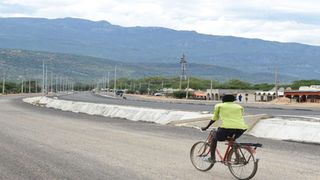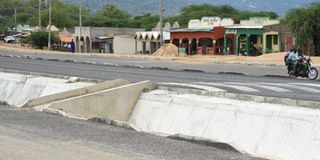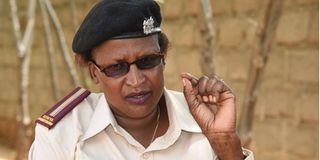
Kainuk trading centre in Turkana County on the Kapenguria-Lodwar road.
| Jared Nyataya | Nation Media GroupTurkana
Premium
In Kainuk, once a bandits’ haven, guns have fallen silent
A couple of years ago, if you were to travel by road to Lodwar, passing through Kainuk town was a matter of life and death.
The town, on the Kitale-Lodwar highway, sent chills down your spine.
Lying at the border between West Pokot and Turkana counties, Kainuk was a battleground for bandits who, in most cases, would target travellers at the Kainuk bridge as vehicles decelerated to circumnavigate the dilapidated road.
So daring were the bandits that they would sporadically spray Kainuk Police Station or Marich Police Station with bullets just to make their presence felt, forcing residents and police to scamper to safety.
All trucks and buses plying the route had to be escorted by security agents from Kainuk police station for fear of being ambushed by the bandits.
Security personnel had marked the stretch between Kainuk and Kakong as a banditry zone.

Kainuk trading centre in Turkana on the border with West Pokot County.
Hell on earth
According to Malcolm Lochodo, a resident, in the past, most travellers would alight at Marich Police Station because it was like hell on earth to pass Kambi Karaya and Lami Nyeusi to reach Kainuk.
He blames cattle rustling between the Pokot and Turkana communities for the fighting that cost many lives and socio-economic livelihoods on both sides.
“Kambi Karaya, Lami Nyeusi to Kainuk were red zones in the past; bandits would appear from anywhere bearing in mind that both sides of the road are bushy. Most travellers would alight at Marich Police Station to be escorted by police,” says Mr Lochodo.
Here, heavily armed bandits crouched in the bushy hills, picking out their targets on the road below. With the road all cratered, drivers could not drive fast to escape the gunfire. Everyone plying this route was a sitting duck.
Mr Bernard Rotich, the Nation’s Editorial crew assistant at Eldoret Bureau, says that over the years, Turkana assignments could not give him peace.
“Driving along the Kapenguria-Lodwar road has always been fun with the surrounding hills and shrubs but Kainuk, which is at the border of West Pokot and Turkana Counties, is the most dangerous area,” says Mr Rotich.
“Two kilometres on both sides was always a nightmare with bandits targeting motorists plying the route.”
He recalls how one time, as they were headed to Lodwar for an assignment, they were forced to wait for more than 30 minutes at Kainuk as the security team tackled bandits who had laid an ambush on the highway.
Normalcy is back
But for some time now, the guns have fallen silent and normalcy is back thanks to peace activists and presence of Rapid Deployment Unit (RDU) officers.
“Seeing people walking freely and interacting from both sides now is a plus for those who have been championing peace for a long time,” says Mr Rotich.
As a result of this, traders and investors are back in town to tap into the growing number of travellers and transporters who use Kainuk as a stopover on their way to and from Lodwar and South Sudan.
“Peace is back, we can now run our businesses peacefully; some of us had fled but we are back and optimistic that the situation will be like this permanently,” says Margaret Arot Ekal, a businesswoman on Senator Abong Street in the town.
The town, which used to be dark at night, now has streetlights.
Kainuk is said to have a bigger potential of expanding than Lodwar or Kapenguria due to its proximity to Nasolot National Reserve, which has been dormant for years due to insecurity and poor roads.
When you visit Kainuk now, a lot of things have changed for the better and residents and traders are happy with the return of peace.
Gunshots, which used to be the order of the day, have vanished and replaced by the buzz of business and the roar of heavy machinery of the Anti-Stock Theft Unit (ASTU) and the RDU.
“Everything is now okay in Kainuk. I call upon investors to come here and do business. This town has a vast potential and resources like gold. Streetlights have been installed, the bridge is complete,. and the road is just fine,” says area Chief Sarah Akoru Lochodo.

Kainuk Location Chief Sarah Akoru Lochodo.
Voluntary disarmament
She attributes the rebirth of Kainuk to voluntary disarmament after Interior Cabinet Secretary Fred Matiang’i in 2018 gave an order that communities in the North Rift voluntarily return illegal ammunition or else the government will use force.
“I was pleased by the government's decision to bring RDU in Kakong sub-location. We worked together with them in getting those guns; we would raid places where those guns were and retrieve them without any force. I managed to retrieve more than 38 illegal guns,” recalls Ms Lochodo.
According to the chief, the entire Turkwel corridor has been peaceful for the last two years now, with only a few cases of cattle rustling reported.
The return of peace has also been attributed to the sobering up of political leaders in the area.
Residents say politicians have been fuelling the flames in the bloody confrontation between two communities that heavily rely on livestock for survival.
“Some leaders have, over the years, used perennial clashes over water and pasture to intensify aggressions between the two neighbouring communities, who are also in-laws, forcing this area to lag behind in development,” says Samuel Losike, a resident.





